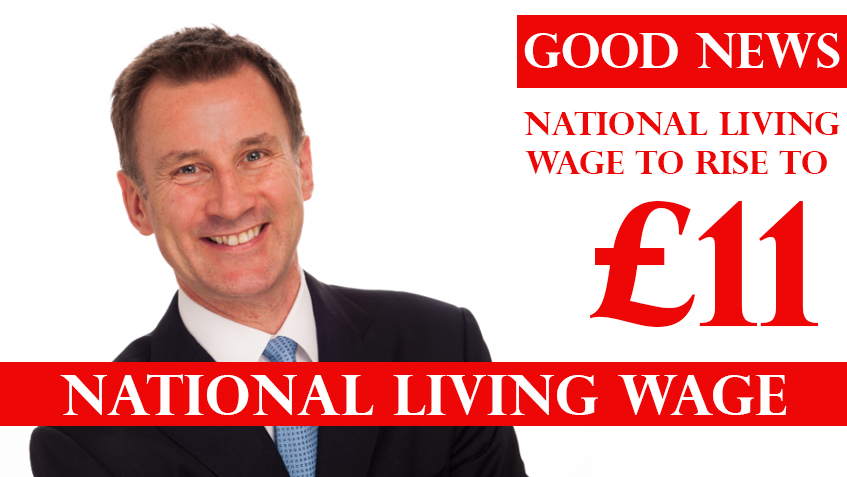National living wage to rise to £11 an hour, Jeremy Hunt confirms
The national living wage is set to increase to at least £11 an hour from next April, the chancellor has confirmed.

In a speech to the Conservative Party conference, Jeremy Hunt said the move would benefit two million of the lowest-paid workers.
He also promised to review the sanctions regime to ensure “fairness” in the benefits system.
But the conference continues to be overshadowed by questions over HS2.
Doubts have been raised about the future of the high-speed rail line, after ministers failed to guarantee it would run north from Birmingham to Manchester, where the conference is being held.
Downing Street has insisted no “final decisions” have been taken, but the government has also not guaranteed it will go ahead, amid speculation it will be scrapped to save money.
The national living wage – as it has been officially called since 2016 – is lowest amount workers aged 23 and over can be paid per hour by law, and is currently £10.42 an hour. There are lower rates for younger workers.
The rates are decided each year by the government, based on the advice of an independent advisory group, the Low Pay Commission. Ministers generally accept the commission’s recommendations.
The government had already set a target for the national living wage to reach two-thirds of median hourly pay by October next year.
The Low Pay Commission has not yet confirmed its recommendations for next year, but it estimates the rate needed to meet the government’s target should be between £10.90 and £11.43.
Abigail Lewis, a care assistant making under £11 per hour, says a pay raise will “help for now”. But, rising costs means her wages are always “playing catch up”.
Ms Lewis said she would be happy about any increase as the cost-of-living crisis has “left me with less money than I normally I have”.
With an increase she said she might just cover bills better and help her and her partner put aside money for savings.
Join Our Whatsapp Channel : https://whatsapp.com/channel/0029Va4bIhd6GcGCVFJLgE2L
Benefit sanctions
Alongside the announcement on the living wage, Mr Hunt also said ministers would look again at the regime to enforce the requirements to look for work that apply to certain benefits.
He added that since Covid, things “have being going in the wrong direction,” with around 100,000 leaving the labour force every year “for a life on benefits”.
He did not announce any details of the new approach, however, with the plans due to be set out at the Autumn Statement in November.
Reports have suggested the government is looking at barring people from making a new claim for a certain period if they have been persistently sanctioned for six months.
At a fringe event on Sunday, Work and Pensions Secretary Mel Stride said the government was already looking at the Work Capability Assessment “so it reflects the way the modern world works”, including increased opportunities for home-working.
The assessment decides how much an individual’s illness or disability limits their ability to work. If someone is deemed fit for work, their benefits may be withdrawn.
Getting people back into employment is a key part of the government’s plan to grow the economy and was a focus of the chancellor’s Budget in March.
The number of people who cannot work because of long-term sickness has been rising, with recent figures showing 2.5 million were missing from the labour market because of medical conditions.
SOURCE CREDITS: https://www.bbc.com/news/uk-politics-66978109
For more related Articles: https://destinydot.com/news-portal/
For more about UK Immigration:https://gov.uk
